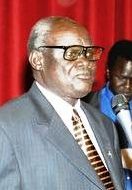South Sudan to cut spending, says revenue tight
April 21, 2007 (JUBA) — The government of southern Sudan will have to cut spending for the rest of 2007 in the face of lower-than-expected revenue, mainly from oil, the acting finance minister said.

A peace deal signed in 2005 ended 21 years of civil war and led to the creation of the semi-autonomous south Sudan government. Under the agreement, the south receives 50 percent of oil revenue generated in its area.
“The overall level of oil revenues is lower than expected,” Chang said. “We must be realistic.”
He said oil revenues received from Khartoum for January and February were $153.6 million and that the southern government was looking into ways to improve non-oil revenue.
Chang said the critical financial situation would force the government to borrow to bridge the gap between revenue and spending required for projects in the underdeveloped south.
Chang took over the finance ministry in March after the government stripped minister Arthur Akuien Chol of his immunity from prosecution to allow the authorities to question him in connection with a corruption inquiry.
Under Chang’s guidance, the ministry is introducing an action plan including the establishment of a cash management committee to set limits on government spending in line with the revised budget estimates.
Each ministry will now have to send a monthly report of its expenditure.
“Much spending during 2006 took place outside of the approved budget, depleting reserves, which is why we are more or less in a very precarious financial position,” Chang said.
Government spokesman Samson Kwaje told Reuters some 70 percent of the budget went on salaries, leaving little for much-needed development projects.
Chang said the government had decided to stop hiring new employees except in exceptional circumstances.
“The payroll is out of control and must be checked,” he said.
(Reuters)
